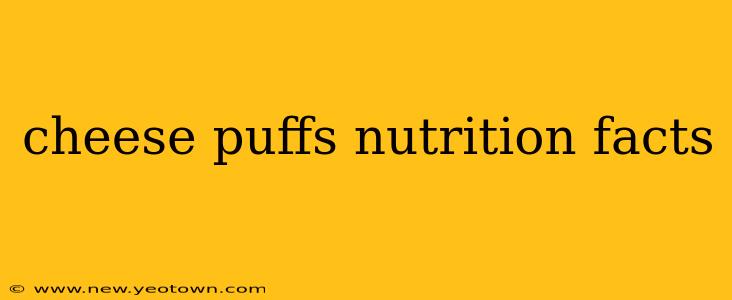Let's be honest, cheese puffs are undeniably delicious. That irresistible cheesy flavor and satisfying crunch make them a popular snack for kids and adults alike. But how healthy are these tiny, puffed delights? This isn't just about calories; we'll delve into the nutritional details, explore healthier alternatives, and answer some frequently asked questions to help you make informed choices about this beloved snack.
Our journey begins with a look at the typical nutritional breakdown of a standard serving of cheese puffs. Keep in mind that specific nutritional information varies depending on the brand and recipe.
A Typical Nutritional Profile
A single serving (usually around 1 ounce or 28 grams) of cheese puffs typically contains:
- Calories: Around 150-170 calories. This can fluctuate greatly depending on the size and ingredients.
- Fat: A significant portion of these calories comes from fat, usually around 8-10 grams, often including saturated and trans fats. These fats can contribute to increased cholesterol levels and other health concerns if consumed excessively.
- Carbohydrates: Cheese puffs are predominantly carbohydrates, ranging from 15-20 grams per serving. These carbs are largely simple carbohydrates which can lead to rapid spikes in blood sugar levels.
- Protein: Protein content is usually low, typically around 2-3 grams per serving.
- Sodium: This is where cheese puffs often fall short. They're notoriously high in sodium, often exceeding 200-300mg per serving. High sodium intake is linked to high blood pressure and other health issues.
What are Cheese Puffs Made Of?
The primary ingredients in most cheese puffs are:
- Corn Flour or Maize Flour: This forms the base of the puffed snack.
- Vegetable Oil: Provides the necessary fat for the texture and flavor.
- Cheese Powder: This contributes the signature cheesy flavor, though it’s often a blend of processed cheese and flavorings rather than real cheese.
- Salt: The primary source of sodium.
- Other Additives: Various additives may be included for preservation, texture, and color.
Understanding these basic ingredients helps us appreciate the nutritional impact of frequent consumption.
Are Cheese Puffs Healthy?
The short answer is no, cheese puffs are not considered a healthy snack. Their high fat, sodium, and simple carbohydrate content outweighs any nutritional benefits. Occasional indulgence isn't likely to cause significant harm for most people, but regular consumption should be approached with caution.
What are the Health Risks Associated with Eating Cheese Puffs Regularly?
Regular consumption of cheese puffs can contribute to several health problems, including:
- Weight gain: High calorie and fat content.
- Increased cholesterol: High saturated and trans fat content.
- High blood pressure: High sodium content.
- Blood sugar spikes: High simple carbohydrate content.
- Nutrient deficiencies: They offer little in the way of essential vitamins and minerals.
Are There Healthier Alternatives to Cheese Puffs?
Absolutely! There are many healthier snack options that can satisfy that crunchy craving:
- Air-popped popcorn: Low in calories and fat, a good source of fiber.
- Baked veggie chips: Provides vitamins and minerals.
- Fruits and vegetables: Naturally sweet and packed with nutrients.
- Whole-grain crackers: Choose those with lower sodium content.
- Homemade cheese puffs (using healthier ingredients): While still containing calories, you can control the salt and fat content.
How Many Cheese Puffs Can I Eat in a Day?
This depends entirely on your individual calorie and dietary needs. Moderation is key. Sticking to a single serving (typically around 1 ounce) is a good starting point, but even that should be limited to an occasional treat.
What are the Different Types of Cheese Puffs?
The market offers a variety of cheese puffs, often differing slightly in ingredients and nutritional profile. Some brands might boast "reduced fat" or "lower sodium" options, but it's crucial to always check the nutrition label before purchasing.
Ultimately, cheese puffs can be a delightful occasional treat, but shouldn't form a regular part of a healthy diet. Understanding their nutritional composition allows for mindful choices and helps balance enjoyment with well-being.

